
On January 7, 2022, Tzu Chi Cambodia conducted a distribution for 126 families who rely on scavenging from the Dangkor landfill in Phnom Penh for a living. Huang Shu-zhen
Cambodia
Phnom Penh, the capital of Cambodia, has a population of over two million. All the garbage produced by its residents is sent to the Dangkor landfill, around which live many destitute families who make a living by scavenging from the dump. When the COVID-19 pandemic situation became more serious last year in Cambodia, these people avoided going out. However, pandemic or not, they still had to get by, so they had no choice but to continue scavenging at the landfill. Unfortunately, recycling merchants refused to buy the items they had collected, making their lives even more difficult.
Tzu Chi volunteers have been caring for this group of people for eight years. To help them ride out the challenges of the pandemic, they distributed food to them three times during this difficult period. The most recent distribution was held on January 7, 2022. One hundred and twenty-six families each received 40 kilograms (88 pounds) of rice, a blanket, and other items.
Quite a few residents brought the coin banks they had received from Tzu Chi to the distribution to donate to the foundation the money that they had saved. A female aid recipient said, “I’ve received Tzu Chi’s aid several times. Though our lives are hard and we live hand to mouth, we can still give what we can to help others.” Volunteer Hsieh Ming-hsuan (謝明勳) told everyone Tzu Chi would make sure every bit of their love would reach those in need.
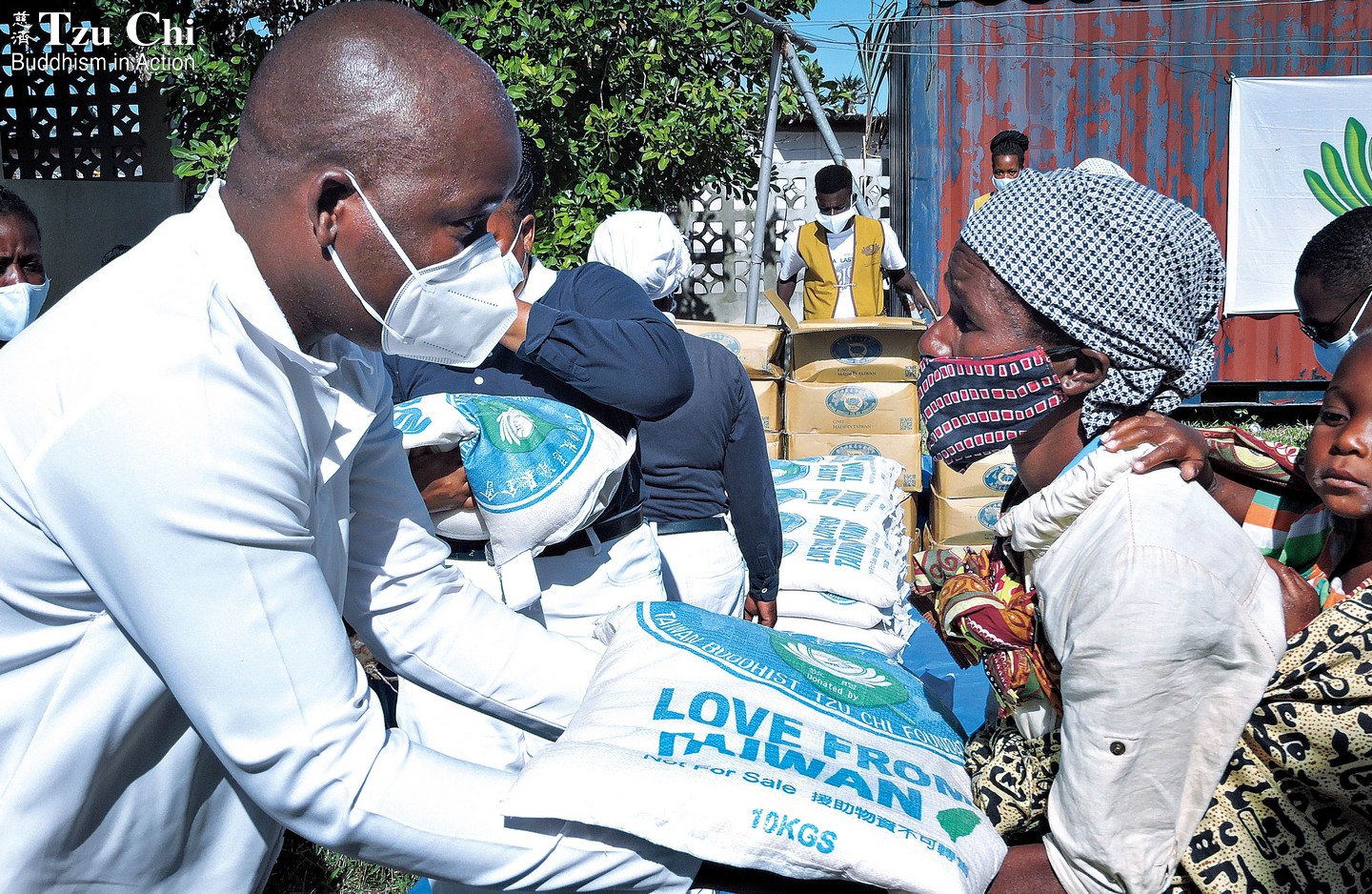
Tzu Chi Mozambique launched a nutritional supplement program in collaboration with a local hospital in June 2021, providing multigrain powder and rice to beneficiary families. Courtesy of Tzu Chi Mozambique
Mozambique
Malnutrition is a leading cause of death for children under five in Mozambique, second only to HIV/AIDS and other infectious diseases. Over 40 percent of children in that age group suffer from chronic malnutrition. To help address this issue, Tzu Chi Mozambique worked with a local hospital and started a three-month program in Beira, Sofala Province, in June 2021. The program provided 26 impoverished children infected with HIV/AIDS with eight kilograms (18 pounds) of multigrain powder each month. Rice was also provided to the children’s families.
Most of the participating children’s fathers or mothers had died of AIDS, and their families were having difficulty scraping by. Volunteers visited the children every month during the program and measured their weight, height, and the girths of their upper arms to track their condition. Malnutrition can lead to edema, so measuring the children’s arms helped gauge the effects of the program. After three months, malnutrition among the children was reduced from 60 percent of the participants to 10.5 percent. With such encouraging results, Tzu Chi expanded its aid to include 249 children infected with HIV/AIDS in Nhamatanda District, Beira, and Maputo, providing them with multigrain powder.
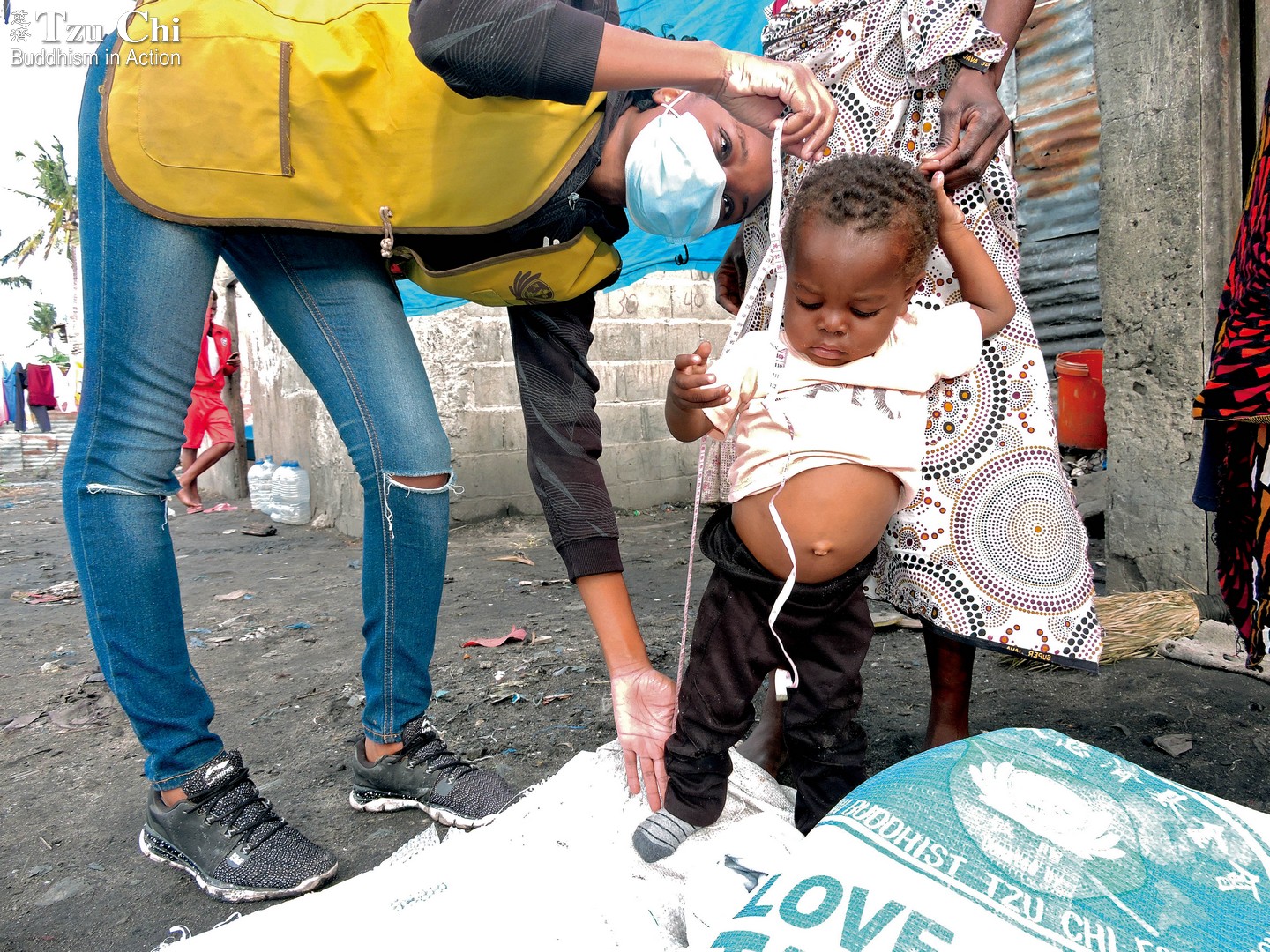
A volunteer measures the height, weight, and girth of the upper arm of a child participant of Tzu Chi Mozambique’s nutritional supplement program. Courtesy of Tzu Chi Mozambique
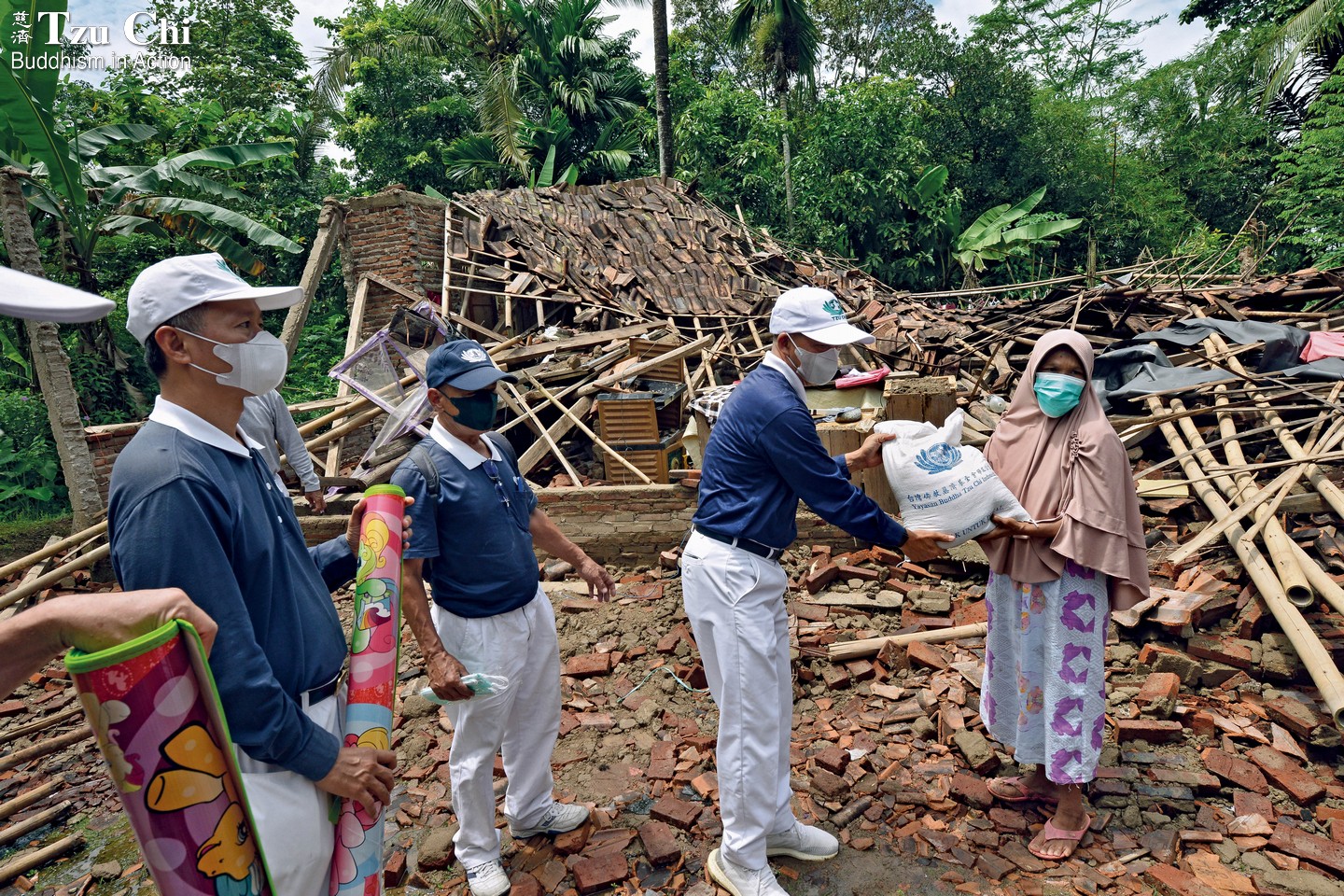
A volunteer hands over rice to a victim of a quake that rocked Pandeglang, Indonesia, on January 14, 2022. Anand Yahya
Indonesia
On January 14, 2022, a magnitude 6.6 earthquake jolted Pandeglang, Banten Province, damaging thousands of houses. Fortunately, no fatalities were reported. Nine Tzu Chi volunteers from Jakarta traveled to the disaster area on January 16 to assess the situation. After determining the needs of quake survivors, the team held a videoconference with employees at the Tzu Chi Indonesia office in Jakarta. Work started immediately afterward to prepare relief supplies to be shipped to Pandeglang.
The relief supplies arrived at the disaster area on January 19. They included a thousand kilograms (2,204 pounds) of rice (purchased with money donated by entrepreneurs and the Indonesian Chamber of Commerce and Industry), a hundred packages of daily necessities, a thousand surgical masks, 30 boxes of drinking water, a hundred canvas tarpaulins, and other items. A small ceremony followed on the same day, during which volunteers and personnel from the military symbolically handed over some aid items to survivors.
Susana (an alias), 47, was one of the aid recipients. She told volunteers what had happened on the day of the earthquake. She and her little nephew were taking a bath in a river near their home when the quake hit. They rushed home as quickly as possible afterwards. When they arrived, Susana was relieved her husband and other family members had escaped from their house, but then—right in front of her eyes—the house collapsed. She passed out on the spot.
They had built the house in phases just three years earlier, and now it was gone. Susana wondered what they were to do. Her niece comforted her, saying, “At least we’re all safe and sound. We can always rebuild the house.”
Susana and her family moved into a tent provided by the government behind their collapsed home. It was uncomfortable. “It becomes very cold when it rains, and becomes muddy all around the tent,” she said. “After just a week, I ached all over.” She hoped they could start rebuilding soon.
She was very thankful for Tzu Chi’s aid after suffering such a heavy loss. She said that the items provided by the foundation were very practical and would make their lives in the tent easier.
Volunteers explained that the supplies Tzu Chi provided, including blankets, sarongs, toiletries, and buckets, were all badly needed items. They hoped their assistance could help ease the recipients’ burdens and soothe their minds.
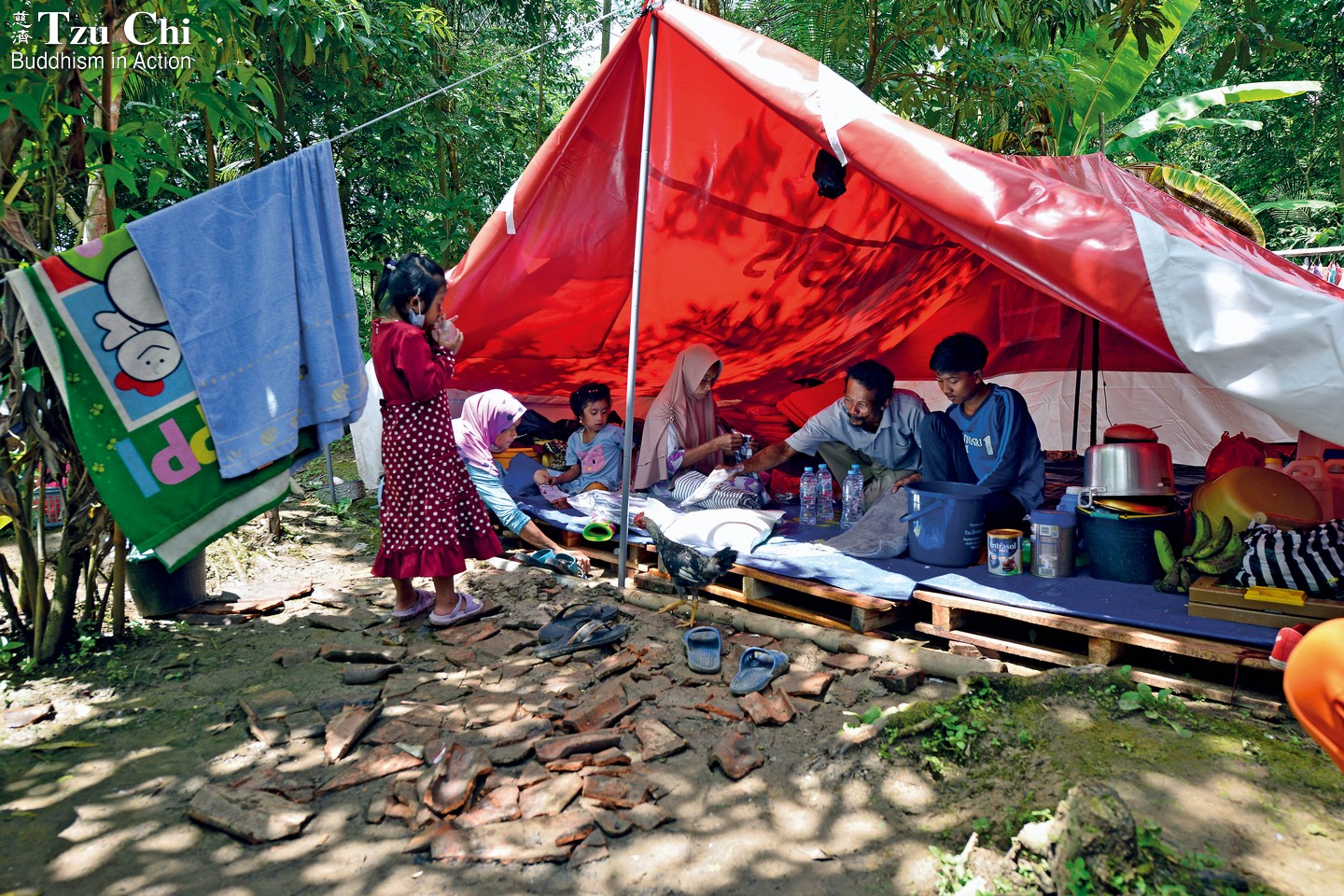
Quake survivors in Pandeglang take shelter in a tent. Anand Yahya
Sri Lanka
Volunteers in Sri Lanka held a COVID-19 food relief distribution at the Tzu Chi Hambantota office on December 15 and 16, 2021. One thousand three hundred and eighty-four families received rice, flour, lentils, and spice.
A lot of preparatory work was needed before the distribution could take place. Volunteers visited needy families to compile recipient rosters, entered data on beneficiary households, and packed the goods to be distributed. Just packing the goods required 108 volunteer shifts over six days, from 8:00 a.m. to 5:30 p.m. The food distributed this time was enough to last a family of four for a month.
Sri Lankan President Gotabaya Rajapaksa had declared an economic emergency in Sri Lanka at the end of August 2021, following a sharp fall in its currency and a surge in food prices. Given the financial situation in the country, the food provided by Tzu Chi was a great help to the beneficiary families.
In addition to helping the poor, Tzu Chi Sri Lanka provided aid to five local temples. Many temples were experiencing food shortages due to the pandemic, so the help extended by Tzu Chi was greatly appreciated.
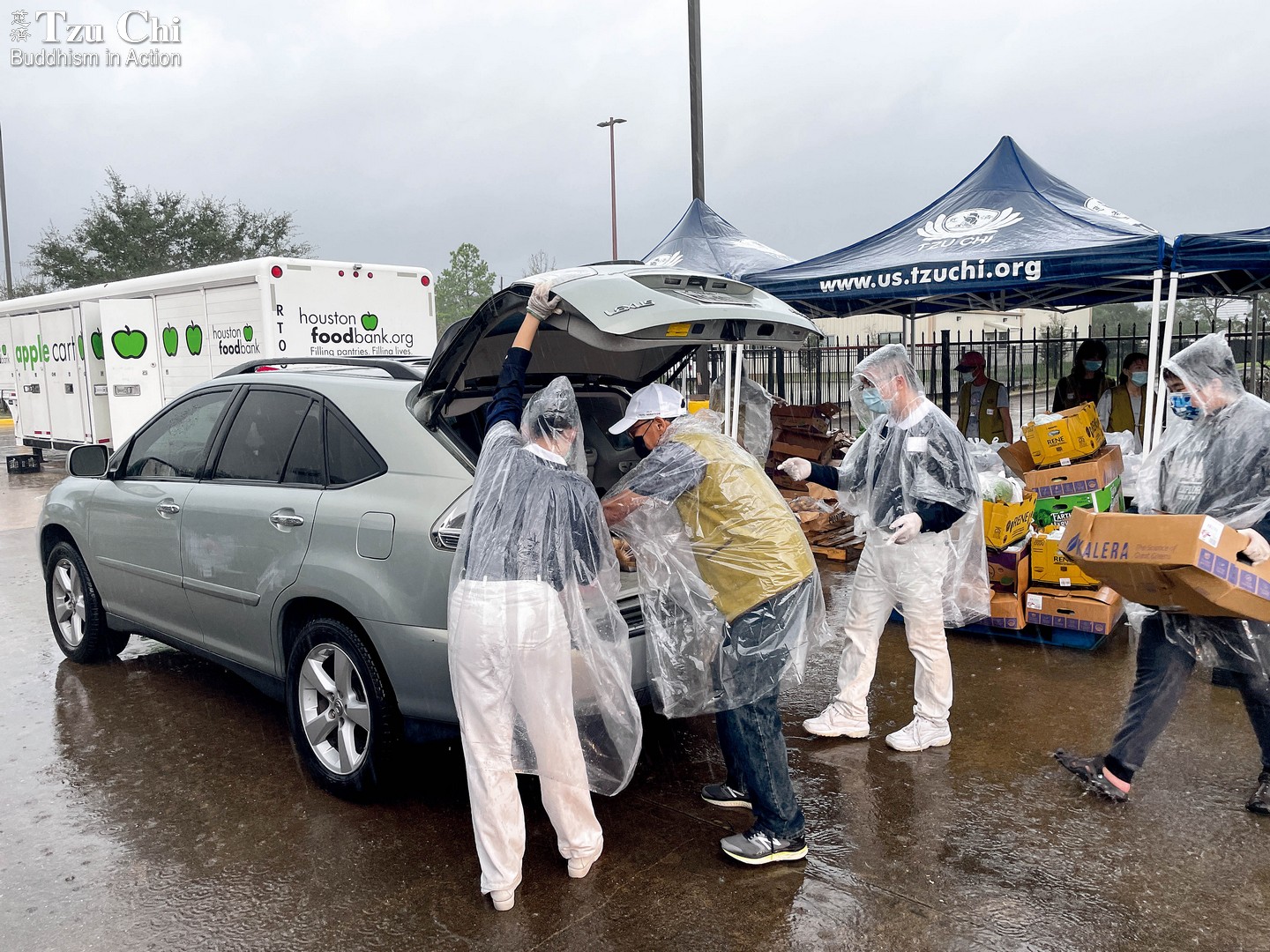
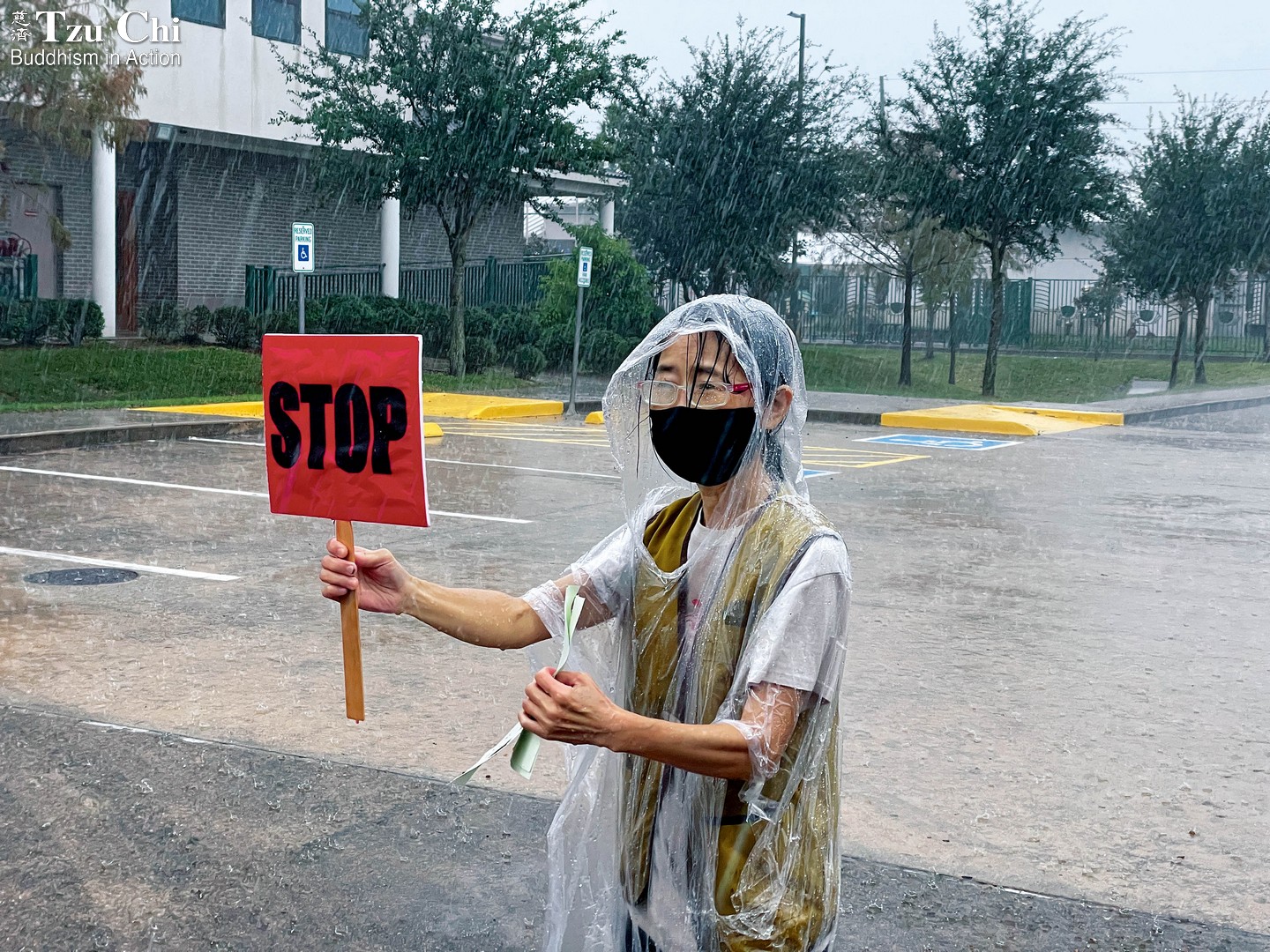
Volunteers work amidst heavy rains in a drive-through distribution cosponsored by Tzu Chi Texas and the Houston Food Bank. Wu Yu-zong
The United States
Tzu Chi Texas teamed up with the Houston Food Bank in August 2020 to begin regularly distributing food aid to the needy. The last distribution of 2021 took place on December 18. The event was carried out in a drive-through fashion due to the coronavirus pandemic.
Rain poured down the day of the event. Even though disposable raincoats were distributed and canopies had been set up in anticipation of the rain, it was impossible to remain dry. Despite the wind and rain, volunteers resolutely stuck to their posts to see the distribution through to the end.
Besides the on-site distribution at the Texas Jing Si Hall, volunteers made deliveries to beneficiary families to make sure no one missed out on the love and aid. All told, 50 volunteers together served 210 families on this day.



